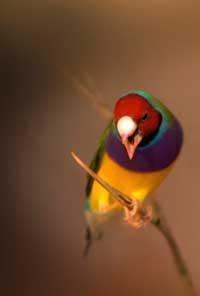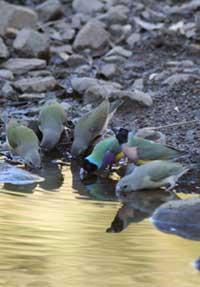Color, the following

In the case of goulda diamonds, the last word is the female. In fact, according to biologists at Macquarie University in Sydney, Gould's diamond females can decide to some extent the sex of the offspring based on their partner's appearance. Gould's diamonds are the colorful Australian birds ( Erythrura gouldiae). They may have a red or black head. Thus, Gould's diamond female can opt for red or black headed males. According to this choice, more or less male or female offspring are born.
When red and black Goulda diamonds cross, many young, especially females, die. In this sense, researchers want to know if Gould's diamond females can control the proportion of pups and females. And if so, when crossing with males of different colors, the female would not lose unnecessary energy creating the female offspring that will die.
To prove whether this is so, researchers have taken Gould's red head and black head diamonds, among which they have crossed the reds with the reds, blacks with blacks and reds and blacks with each other. Gould diamonds, with a red head and a black head, have seen the birth of male offspring, representing 82% of the eggs. When crossing two Gould diamonds with a head of the same color, the proportion of male and female offspring born is similar. Does the female control?

To do this, Goulden diamonds have been taken with a red head and a black head, and their heads have been painted in red and black. That is, they have painted black diamonds with a red head and vice versa. Most surprisingly, they have seen that the color that Gould's diamond female sees conditions the proportion of male and female offspring that will be born later, even if the color is artificial.
In addition, researchers have found that by pooling Gould diamonds of the same color they lay more eggs and that Gould's diamond mothers try to care for and feed their offspring with more attention.
Reproductive strategies

Goulda diamonds come together and cross for life. However, let us not think this is so in all animal species. Breeding strategies differ greatly from species to species. In some species, males have a single partner throughout their life and use all the energy they have to ensure the transmission of their genes, caring for their offspring. On other occasions the couple changes constantly in the hope that someone can fertilize.
In females there is everything: in species with a single partner, the female seeks an ideal male to care for their offspring, bring food and protect their family. In other species, in times of heat, the female tries to join with as many males as possible.
Published in 7k
Buletina
Bidali zure helbide elektronikoa eta jaso asteroko buletina zure sarrera-ontzian











